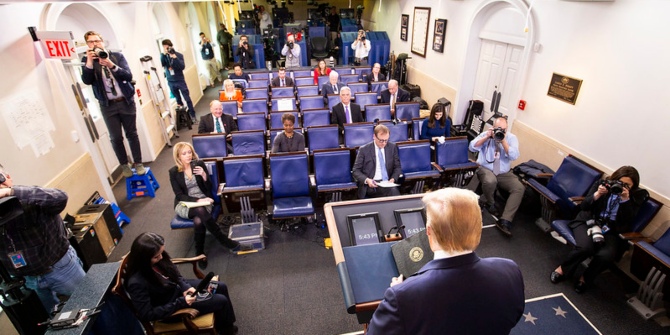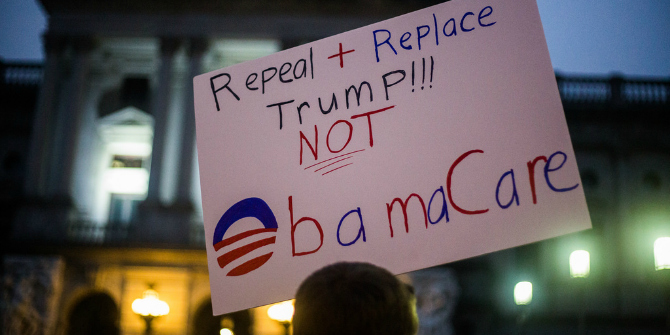 Earlier this month, House Republicans released their proposed bill to repeal and replace Obamacare – the American Health Care Act (AHCA). With estimates that the bill may cause 24 million people to lose health insurance coverage gained under Obamacare, Philip Rocco writes that the leadership of the Republican Party is now faced with asking its members to vote for a bill which was written with the Party’s core supporters in mind, but which may end up hurting them the most.
Earlier this month, House Republicans released their proposed bill to repeal and replace Obamacare – the American Health Care Act (AHCA). With estimates that the bill may cause 24 million people to lose health insurance coverage gained under Obamacare, Philip Rocco writes that the leadership of the Republican Party is now faced with asking its members to vote for a bill which was written with the Party’s core supporters in mind, but which may end up hurting them the most.
Earlier this week, the Congressional Budget Office released what may be the dreariest analysis of social policy since it was created in 1974. According to the budget office report, House Republicans’ repeal and replacement of the Affordable Care Act with their own American Health Care Act (AHCA) would cause 24 million people to lose coverage obtained under Obamacare. This projection, and the Republican leaders’ dogged pursuit of policy change in spite of it, suggests that the politics of Obamacare are changing.
After eight years of being Obamacare’s “opposition party,” Republicans now have unified control of the federal government and have consolidated power in a majority of the states. This has created a window of opportunity, if not a window of necessity, for Republicans to make good on their promise to repeal and replace the ACA.
But in politics as in life, jumping through windows is a high-risk activity. However necessary it may have been, making good on “repeal and replace” has always entailed two major political risks for Republicans. First, the party is limited in its choice of politically acceptable policy alternatives. Democrats, after all, built the ACA with policy instruments borrowed from conservative wonks. This includes tax credits, coverage mandates, and state-based policy solutions. Thus it has been difficult to arrive at “credible Republican alternatives.” How does one promise to privatize benefits or devolve authority to the states when a policy is already significantly privatized and devolved? Within the party itself, the House Freedom Caucus has also sought to frame the debate around the issue of eliminating taxes and cutting spending rather than insurance coverage itself. Taken together, these factors have left party leaders in a position where the only alternatives that looked possible of clearing the House were those that significantly cut benefits under the program, even though this was likely to inflict pain on their own constituents.
Second, to Republican leaders like House Speaker Paul Ryan, the opportunity to repeal and replace the ACA looks less like a single entree and more like an all-you-can-eat buffet. More than simply restructuring benefits in the individual marketplace and claiming credit for a victory over Democrats, Ryan and others have heaped on major reforms to entitlement programs like Medicaid and Medicare. This has served to further alienate core program constituencies such as governors, physicians, hospitals, and seniors.

In short, Republican leaders are faced with a situation in which they must ask rank-and-file members to take actions that could impose a large amount of political pain. They have attempted to solve this in at least three ways. First, they have relied on what Douglas Arnold refers to as “strategies of procedure”, intended to give rank and file members reasons to vote for the legislation despite its apparent effects on their constituents. This included limiting access to draft text of the legislation, communicating the bill’s content via slick white papers and cheery PowerPoint presentations, and holding only perfunctory markup sessions. Second, leaders like Paul Ryan, as well as executive-branch appointees Tom Price (Secretary of Health and Human Services) and Mick Mulvaney (Director of the Office of Management and Budget) went to great lengths to pre-emptively discredit the conclusions of the Congressional Budget Office, suggesting that its predictions of coverage losses under the Republican plan simply couldn’t be accurate. My ongoing research suggests that this move has few historical parallels. Finally, leaders have attempted to focus public attention to the most popular elements of the Republican plan–eliminating the individual mandate and reducing the deficit–as well as illustrating the plan’s benefits for younger, healthier consumers. They have also suggested other reforms are on the way later, but have failed to provide extensive details.
Clever or not, these strategies only help to reveal the prison Republicans have found themselves in. Even if “repealing Obamacare” remains an applause line, the Republicans’ plan cuts benefits from older and sicker patients and only serves to enhance some of the law’s most unpopular elements. For example, an underemphasized implication of the Congressional Budget Office report is the AHCA’s elimination of Obamacare’s actuarial value requirement. This would allow insurers to offer plans that pay only a small percentage of annual medical expenses and leaving consumers with the tab. Further, it is hard to imagine how governors and Senators will tolerate major cuts to Medicaid, even under the banner of “state flexibility.”
These consequences notwithstanding, it is not yet clear that the AHCA is political suicide for Republicans. If partisanship is indeed strong among voters, Republican leaders may be betting that they will be able to maintain that they are “making the most of a bad situation” and pin the blame for bad policy outcomes on Obamacare itself. For members in especially safe seats, jumping through the policy window may ultimately be worth the risk. Yet for all the confusion about “alternative facts”, one conclusion remains hard to dispute: no one truly knows what’s on the other side.
Featured image: Harrisburg, PA – 20170120-182409 by Paul Weaver is licensed under CC BY NC SA 2.0.
Please read our comments policy before commenting.
Note: This article gives the views of the author, and not the position of USAPP – American Politics and Policy, nor the London School of Economics.
Shortened URL for this post: http://bit.ly/2nsu6gJ
_________________________________
 Philip Rocco – Marquette University
Philip Rocco – Marquette University
Philip Rocco is an Assistant Professor of Political Science at Marquette University. He received his PhD in political science from the University of California, Berkeley and was a postdoctoral associate at the University of Pittsburgh Health Policy Institute. He is a co-author of Obamacare Wars: Federalism, State Politics, and the Affordable Care Act (University Press of Kansas, 2016). His published research has been featured in the Journal of Health Politics, Policy, and Law, Journal of Aging and Social Policy, and the Journal of Public Policy, among other venues.






